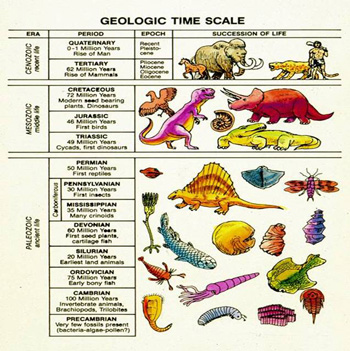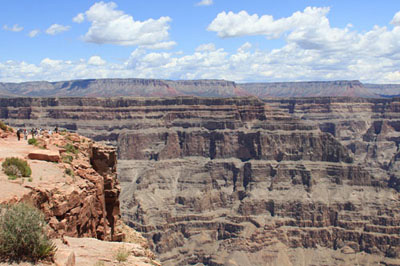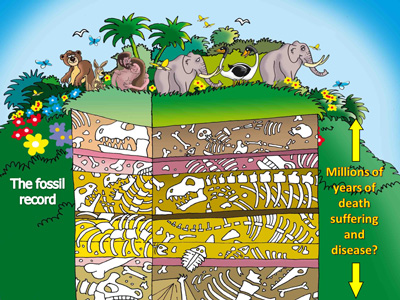And why is it important?
Often, people challenge biblical creationists with comments along the lines of, “I believe God created, and I don’t believe in evolution, but He could have taken billions of years, so what’s the big deal about the age of the earth?” Some claim that an emphasis on ‘6 literal days, 6,000 years ago’ even keeps people away from the faith, so “Why be so dogmatic? Why emphasize something so strongly that’s not a salvation issue?”
 It might come as a surprise that we agree—to a point. The timescale in and of itself is not the important issue. So why does CMI emphasize it? It’s important because the issue ultimately comes down to, “Does the Bible actually mean what it plainly says?” It therefore goes to the heart of the trustworthiness of Scripture. As such, compromising with long ages also severely undermines the whole gospel message, thus creating crises of faith for many as well as huge problems with evangelism.
It might come as a surprise that we agree—to a point. The timescale in and of itself is not the important issue. So why does CMI emphasize it? It’s important because the issue ultimately comes down to, “Does the Bible actually mean what it plainly says?” It therefore goes to the heart of the trustworthiness of Scripture. As such, compromising with long ages also severely undermines the whole gospel message, thus creating crises of faith for many as well as huge problems with evangelism.
The implications of a long-age timescale
The idea of millions or billions of years simply is not found anywhere in Scripture; it is a concept derived from outside of the Bible.
First, we need to understand where the concept of an old earth came from. The idea of millions or billions of years simply is not found anywhere in Scripture; it is a concept derived from outside of the Bible. In 1830, Charles Lyell, a Scottish lawyer, released his book Principles of Geology. He stated that one of his aims was “To free the science [of geology] from Moses.”1 He built his ideas upon those of another geologist, James Hutton, who advocated a uniformitarian interpretation of the world’s geology. Lyell argued that the thousands of feet of sedimentary layers (laid down by water or some other moving fluid) all over the earth were the result of long, slow, gradual processes over millions or billions of years (instead of the processes of Noah’s Flood). He believed that processes observed in the present must be used to explain the geological history of the earth. So, if we currently see rivers laying down sediment at an average rate of say 1 mm (4/100th of an inch) per year, then a layer of sedimentary rock such as sandstone which is 1,000 meters (3,300 feet) thick must have taken about a million years to form. This ‘present is the key to the past’ assumption (and its variants) is a cornerstone of modern geology. It involves a rejection of the biblical account of a global watery cataclysm. The millions of years assigned to the various layers in the ‘geological column’ were adopted long before the advent of radiometric dating methods—well before radioactivity was even discovered.
Image by Daniel Smartt

But here’s the theological problem. Those rock layers don’t just have rocks or granules in them. They contain fossils. And these fossils are indisputable evidence of death—and not just of death, but carnivory, disease and suffering. There are remains that have tooth marks in them, and even animals fossilized in the process of eating other animals. There is evidence of disease, cancers, and infection; and general suffering from wounds, broken bones, etc. Biblically, we understand these things only began to happen after the Fall. But because of the Bible’s detailed genealogies, there’s no way for the biblical Adam to exist millions of years ago, before death and suffering started happening in the uniformitarian time scale. The implication of long-age belief is that God ordained death before the Fall of man, but the Bible clearly states that it was Adam’s actions that brought death into the world (Romans 5:12).
The god of an old earth
The idea that death was in creation before the Fall has major implications for the character of God. The same problem arises if one thinks that God used evolution to create. Evolution is a random and wasteful process that requires millions of ‘unfit’ organisms to die. Countless transitional forms would have arisen, only to fall as casualties in the great march ‘forward’. At some point, this allegedly ‘good’ God-ordained lottery of death finally resulted in humans, and then God looked at His image-bearers, standing on top of layers upon layers of rocks filled with the remains of billions of dead things, and proclaimed His whole creation—along with the evidence of all the death and suffering that went into creating it—to be ‘very good’ (Genesis 1:31). So we can see that long ages don’t fit in the biblical view, whether or not someone believes in evolution along with it.
 At the end of day 6 God pronounced his finished creation as very good. If evolution were true , would Adam and Eve have been standing on a fossil graveyard of death and struggle over millions of years that God called good. The Bible describes death as the last enemy to be destroyed
At the end of day 6 God pronounced his finished creation as very good. If evolution were true , would Adam and Eve have been standing on a fossil graveyard of death and struggle over millions of years that God called good. The Bible describes death as the last enemy to be destroyed
To summarize, the age of the earth was derived from the rock layers, which have fossils in them, which puts death, suffering and disease before the Fall. The Bible is clear that there was no death before Adam (Romans 5:12).
The gospel of an old earth
Some alleged ‘experts’ try to sidestep this ‘very good’ issue by saying that the Fall only caused human death and disease. This cannot be true. For one thing, Romans 8:19–22 clearly teaches that the curse of death and suffering following Adam’s Fall affected “the whole creation”, i.e. the entire physical universe.
But even if we set that aside for the sake of argument, there is another problem, because we have human remains that are ‘dated’ as hundreds of thousands of years old. This is well before any possible biblical date for Adam, which places him in the Garden about 6,000 years ago. Many compromising positions see these remains as those of ‘pre-Adamites’—soulless non-human animals. But these skeletons fall within the normal range of human variation. And Neandertals, for example, show signs of art, culture and even religion. And recently, the sequencing of actual Neandertal DNA shows that many of us carry Neandertal genes—i.e. we are the same created kind. To call them ‘non-human animals’ seems entirely contrived to salvage the long-age belief system.
Also, Romans 5:12 states that “sin came into the world through one man, and death through sin, and so death spread to all men because all sinned”. It gives no indication that the Fall caused only human death. To distort the interpretation of Romans 5 to say that death was limited to humans would mean that Adam’s sin only brought a partial Fall to God’s creation; yet Romans 8:19–20 tells us the whole creation groans under the weight of sin and is subjected to futility. And Genesis 3:17–19 tells us that the very ground was cursed so that it produced thorns and thistles.2 If only a partial Fall occurred, then why will God destroy all creation to bring about a new one instead of a partial restoration? Why not just restore humans if the rest of creation is still “very good”?
If only a partial Fall occurred, then why will God destroy all creation to bring about a new one instead of a partial restoration? Why not just restore humans if the rest of creation is still ‘very good’?
Death the last enemy
A central part of the gospel is that death is the last enemy to be destroyed (1 Corinthians 15:26). Death intruded into a perfect world because of sin, and it is so serious that Jesus’ victory over death cannot be entirely manifested while there is a single believer in the grave. Are we expected to believe that something the Bible authors described as an enemy was used or overseen by God for millions of years and was called ”very good”?
A major part of the gospel is the hope we have in this Resurrection and restoration of the creation to its original perfect state. The Bible is clear about the New Heavens and Earth as a place where there is no carnivory, no death, no suffering, and no sin (Isaiah 65:17–25; Revelation 21:1–5). But how can this be called a restoration if such a state never existed?
An evolutionist Anglican priest gave a good summary of what accepting death before the Fall means for Christian theology:
“ … Fossils are the remains of creatures that lived and died for over a billion years before Homo Sapiens evolved. Death is as old as life itself by all but a split second. Can it therefore be God’s punishment for Sin? The fossil record demonstrates that some form of evil has existed throughout time. On the large scale it is evident in natural disasters. … On the individual scale there is ample evidence of painful, crippling disease and the activity of parasites. We see that living things have suffered in dying, with arthritis, a tumor, or simply being eaten by other creatures. From the dawn of time, the possibility of life and death, good and evil, have always existed. At no point is there any discontinuity; there was never a time when death appeared, or a moment when the evil [sic] changed the nature of the universe. God made the world as it is … evolution as the instrument of change and diversity. People try to tell us that Adam had a perfect relationship with God until he sinned, and all we need to do is repent and accept Jesus in order to restore that original relationship. But perfection like this never existed. There never was such a world. Trying to return to it, either in reality or spiritually, is a delusion. Unfortunately it is still central to much evangelical preaching.”3
The Bible is clear about the New Creation as a place where there is no carnivory, no death, no suffering, and no sin. But how can this be a restoration if such a state never existed?
So, one can now see the slippery slope that ensues if we allow for billions of years with or without evolution, because it puts death and suffering before the Fall. Its logical corollary is that it also places evil before the Fall (which no longer exists in his view, as such, since there was nowhere to fall from). And in the process it rules out the hope of a return to a perfect state, since there can be no return to what never was. The gospel itself has been destroyed in the process.
So what did Jesus come to save us from, if not death, suffering, sin, and separation from God? What do we do with passages like Hebrews 9:22, which says “ … the law requires that nearly everything be cleansed with blood, and without the shedding of blood there is no forgiveness”, if death and bloodshed were occurring as ‘natural’ processes for millions of years before Adam? The death of Christ becomes insignificant and unable to pay for our sins. And what is our hope if it is not in the Resurrection and the New Heavens and Earth?
If death is natural, why do we mourn it so? Why can we not accept death as a ‘normal’ part of life? This view robs the gospel of its power and Jesus’ sacrifice of its significance. Following the thought to its natural conclusion has led many people to abandon the Christian faith altogether.
The effect on the church
Practically every Christian leader and theologian who lays out his reasons for believing in long ages rather than the biblical timescale has to admit that Genesis—when read at face value, in the Hebrew as well as the English translations—teaches a straightforward creation in six normal-length days.
The widespread teaching of evolution has dire consequences for our youth, who are leaving the church in droves. Christians who ‘hang in there’ but accept a billions-of-years timescale will have a much harder time defending their faith, and thus, this affects church growth. One of the major stumbling blocks to faith is the question: “Why does a good God allow all the death and suffering in the world?” Such believers cannot adequately explain the origin of death and suffering as a reaction to human sin.
Conversely, believers who have a biblical view of the world’s history have a logical platform for introducing God to people with no scriptural background. Incidentally, this was precisely the approach that Paul used when preaching to similar Gentile audiences (Acts 14:15–17; 17:23–31). In Lystra, he used creation as a key identifying factor that set God apart from mere men like himself and Barnabas. And in Athens he took the philosophers and stoics of the day ‘back to Genesis’ to lay a foundation to introduce them to the true God in the hope that they would repent from their useless idolatry.
If belief in the Bible as plainly written strengthens one’s ability to explain the gospel, and compromise can have such damaging effects, why would anyone compromise? Practically every Christian leader and theologian who lays out his reasons for believing in long ages rather than the biblical timescale has to admit that Genesis—when read at face value, in the Hebrew as well as the English translations—teaches a straightforward creation in six normal-length days. And that this is powerfully backed up by Exodus 20:11, part of the Ten Commandments, which shows the Genesis days were understood as normal-length days, with no room for millions of years or gaps in the text to insert them. But they unfortunately accept that science has somehow ‘proved’ millions of years, which is actually not the case.
Inconsistent Christianity?
While it is possible to be a Christian and believe in an old earth, it would indicate that one has either not thought through the consequences, or that the Bible is not the ultimate authority for one’s faith. If Genesis is not real literal history, how can one know where the truth actually does begin in Scripture? Today’s ‘science’ also ‘proves’ that men don’t rise from the dead. So if we allow that same science to tell us that Jesus has not risen from the dead (which would be consistent in the compromiser’s worldview) then our “preaching is in vain and your faith is in vain,” as the Apostle Paul wrote (1 Corinthians 15:14). Placing our trust in man-made philosophies is reminiscent of the man that Jesus described in Matthew 7:26 when He said: “But everyone who hears these words of mine and does not put them into practice is like a foolish man who built his house on sand.” Conversely, in verses 24–25 He stated: “everyone who hears these words of mine and puts them into practice is like a wise man who built his house on the rock. The rain came down, the streams rose, and the winds blew and beat against that house; yet it did not fall, because it had its foundation on the rock.”
And because Jesus clearly believed in a literal historical Genesis, so should we.




